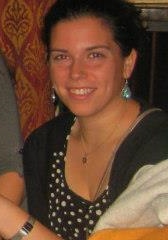Please enjoy a D’var Torah this week from Rebecca Nadis, Rosh Omanuyot HaBamah (Performing Arts). Rebecca teaches Jewish Studies and Social Studies at the Rochelle Zell Jewish High School in Deerfield, Illinois. Reflections on Parashat Beshalach by Rebecca Nadis
During each of the eight weeks of camp, in the final moments of Shabbat, many of us gather together for Seudah Shlishit (literally: the third meal) singing in Chadar Ochel Gimel (the Dining Hall for our oldest campers, senior staff, and guests) to accompany the spirit of Shabbat as it leaves us until its return the next Friday. Chanichim (campers) and Chavrei Tzevet (staff members) sit shoulder to shoulder around freshly cleared tables and spend the last hour of Shabbat in song. We sing of protective angels, building sanctuaries of holiness in our hearts and our love for all of the people of Israel. As the last strands of sunlight slip down beyond Lake Buckatabon, someone calls out “Number 40,” signaling the group to turn to the final song on our song sheet. Every week, without fail, we end our Shabbat with six words that were first sung in this week’s parasha (Torah reading).
Song Number 40 is עזי וזמרת יה, ויהי לי לישועה״.” Ozi v’zimryat yah, vay’hi li liy’shu’a – “God is my strength and my song; God will be my salvation.” “Ozi” as it’s more commonly known at camp, is taken from Shirat Hayam, The Song of the Sea (Exodus 15). This is the song sung by Moses and B’nai Israel (the Children of Israel) as they stood on the far bank of the Sea of Reeds, having crossed to safety and to the possibility of lasting freedom. Shirat Hayam serves as a kind of window into the hearts and minds of our ancestors and what they might have been feeling at that moment. Did they feel relief at having escaped the Egyptian’s pursuing chariots? Maybe some felt triumph and a kind of satisfaction at the destruction that befell their former masters? Perhaps others simply felt wonder and joy at the miracle in which they had just taken part.
Music and song have the power to transport us into the heart of the experience they were written to capture. The joy, or relief, or triumph that Moses and B’nai Israel felt at that moment is infused in every line of Shirat Hayam, and when we tap into the words and the music, that experience can infuse us too. We can feel just a small part of what they felt then, standing on the shores, in the aftermath of perhaps God’s greatest miracle.
At camp, we have many wonderful opportunities to experience the many facets of Jewish life through creativity, adventure and community. Each time I sit down at one of those tables in the Chadar Ochel (Dining Hall) on Saturday evening, I know I will be swept away by the tide of voices that rise in song all around me. When I join with those voices in singing Ozi, I help recreate, for all of us, a glimpse into this moment of miracle in our parashah. Perhaps, just as B’nai Israel sang in praise to God for the miracle of the Sea of Reeds, we who sing Ozi at the conclusion of every Shabbat are giving thanks for the miracle of having been together for another Shabbat, and praying for many more to come together.






